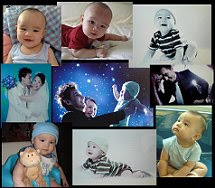I always feel that it is something inevitable, especially as a mother, when you gather your children for play, u will sit and compare~yes... and everyone does it and i hate it! I hate it, cos many a time, i feel that it's a real thin line between concerned and simply kay-po~ Ooops.
I love how my hubby sticks by his "no comparing theory". He really doesn't say or ask anything. He simply feels that eventually all the kids will learn and know the same thing. So what if your child can spell D.O.G now? the others will learn eventually and spell D.O.G too!
It's just earlier or later. So what? ~steady la~
~~~~~~~~~~~~~~~~~~~~~~~~~~~~~~~~~~~~~~~~~~
Anyways, enjoy what's the experts say~
It's tempting to compare your preschooler with his playmates, but it's not constructive. At this age, kids start developing in wildly different ways. Some focus fiercely on language or motor skills for a time while other skills stagnate. And new skills are acquired at a whole range of "normal" rates.
Trust your gut: Does your child seem okay to you? Whenever you have any doubt, don't hesitate to mention it to his doctor.
Your 2-year-old now
How can you tell if your preschooler is on track developmentally? By age 2, children begin to diverge widely in the rates at which they pick up new skills. That said, the American Academy of Pediatrics has a list of milestones that most children reach by their second birthday.
Your 2-year-old should be able to:
- Point to an object that you name.
- Recognize the names of familiar people, objects, and body parts.
- Use short phrases and two- to four-word sentences.
- Follow simple instructions.
- Repeat words he overhears.
- Find an object even if you hide it under two or three blankets.
- Sort objects by shape or color.
- Play make-believe.
Your life now
Your little shadow is not just following you everywhere — he's watching you closely, too. Should you conceal your stronger emotions from him? Not in most cases. It's good for him to understand that people express their feelings. Give a simple explanation: "I was crying because I missed Daddy and it made me sad. But now I feel better. Let's have a big hug and I'll really feel great, then we can have lunch!" If you have an angry outburst, reassure him so he's not frightened.
(All parents lose it sometimes, even though your goal is to be as calm and rational as possible.) Your child is now developing a strong sense of empathy.














No comments:
Post a Comment